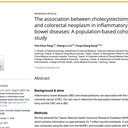Extremely high levels of alkaline phosphatase in adult patients as a manifestation of bacteremia.
Keywords
Abstract
OBJECTIVE
Jaundice resulting from severe bacterial infection is well known, particularly in pediatric literature. Extremely high levels of alkaline phosphatase (ALP) have rarely been emphasized as a manifestation of bacteremia in adults. The aim of this study was to evaluate the characteristics of extremely high levels of ALP in adult patients as a manifestation of bacteremia.
METHODS
Extremely high levels of ALP were defined as being more than 1000 U/L. From April 1998 to May 1999, we retrospectively reviewed those patients' charts who had ALP above 1000 U/L. Sixteen patients that had bacteremia among 96 patients with extremely high levels of ALP at the emergency department of Taichung Veterans General Hospital were included in this study.
RESULTS
Sixteen patients had bacteremia with extremely high levels of ALP, including 9 patients with malignant biliary obstruction (MBO), and 7 patients without MBO. The ALP levels ranged from 1002 to 2061 (1430.13+/-353.84) U/L. Ten patients were male, and 6 were female. Their ages ranged from 19 to 83 (56.13+/-16.51) years. A variety of gram-negative, and gram-positive organisms were identified, and Escherichia coli was the most common pathogen. Among the seven patients of bacteremia without MBO, 5 patients had underlying diabetes mellitus as the predisposing factor for development of the bacteremia. The ages of the bacteremia patients with MBO were older than those of patients without MBO (66.3+/-10.1 us. 43.0+/-13.7 years, P=0.0025).
CONCLUSIONS
Bacteremia from a variety of organisms is a common cause for extreme elevation of ALP. Escherichia coli is the most common pathogen and presented more often in patients with MBO than those without MBO. In the setting o f extremely high levels of ALP as a manifestation of bacteremia, the patients with MBO are as common as those without MBO. We have demonstrated clinically that hepatic dysfunction during bacteremia may be manifested predominantly by extreme elevation of alkaline phosphatase with little abnormality in serum bilirubin.


